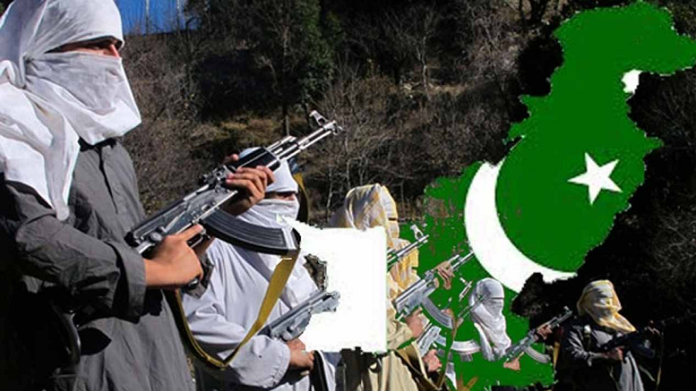Pakistan, a South Asian nation with a population of 241.49 million, holds unique geopolitical significance due to its strategic location. This article delves into Pakistan’s complex relationship with Afghanistan, which has significantly contributed to the prominence of the Tehreek-e-Taliban Pakistan (TTP), posing threats to Pakistan’s stability and domestic peace. Additionally, it examines the geopolitical implications of the TTP threat for Pakistan’s security and offers insights into Pakistan’s future role in global politics.
A Shifting Relationship into Hostility
The deterioration in Pakistan’s relationship with Afghanistan began in 2001, when Pakistan allowed its territory to be used for surveillance against Afghanistan during the U.S. invasion. The U.S. intervention in Afghanistan led to the ousting of the Taliban government, previously supported by Pakistan, and subsequently strained their relations. The situation escalated in 1988 when the Soviet Union withdrew from Afghanistan, allowing the emergence of Al-Qaeda due to the presence of the United States in the region. Osama Bin Laden, once a fighter against the Soviets, founded Al-Qaeda, which later carried out notorious attacks, including the September 11 attacks. These events infuriated the U.S. and strained its ties with Pakistan.
Furthermore, the U.S. invasion resulted in casualties due to drone strikes and counter-terrorism operations by Pakistani armed forces in the tribal areas, the erstwhile FATA, now merged in Khyber Pakhtunkhwa. This led to the birth of the Tehreek-e-Taliban Pakistan (TTP), founded by Baitullah Mehsud. The TTP was heavily influenced by the ideology of the Afghan Taliban, rooted in Sharia law but with its own rigid interpretation of Islamic principles.
TTP’s objective was to overthrow the Pakistani government and implement a strict version of Afghan Taliban law. To achieve this, the TTP launched numerous attacks on Pakistani soil, including the assassination of former Prime Minister Benazir Bhutto. However, in 2009, Baitullah Mehsud was killed in a U.S. drone strike, and leadership of the TTP was passed to Hakimullah Mehsud. Hakimullah met a similar fate in 2013, targeted by a U.S. drone strike. Subsequently, Mullah Fazlullah assumed leadership. Under their leadership, Pakistan experienced deadly attacks, such as the 2014 attack on the APS school in Peshawar, suicide bombings at a U.S. consulate in Peshawar in 2010, and the attack on Pakistani education activist Malala Yousufzai. Despite these conflicts, Noor Wali Mehsud was appointed as the new TTP leader.
Moreover, between 2011 and 2018, the TTP’s influence waned following the killing of Osama bin Laden and the Mehsud leaders. Osama’s death reduced Al-Qaeda’s sway, once admired by the TTP. However, the TTP saw a resurgence in the 2020s, following the signing of the Doha Agreement and the Taliban’s capture of Kabul in 2021, toppling the pro-American regime. In 2021, the TTP claimed responsibility for the killing of nine Chinese engineers working on a hydropower project in Khyber Pakhtunkhwa, an act strongly condemned by former Foreign Minister Shah Mehmood Qureshi.
TTP’s objectives align with those of the Afghan Taliban, both opposing the presence of foreign forces in the region. The resurgence of the Afghan Taliban reignited the TTP’s activities in Pakistan, as evidenced by recent attacks, such as the devastating assault on a Peshawar mosque in January 2023, resulting in nearly 1,000 casualties, and an attack on a Karachi police station. These events underscore the TTP’s formidable presence, which threatens Pakistan’s stability.
Geopolitical Challenges
In the realm of geopolitics, several questions arise, including Pakistan’s ability to control the TTP threat and the source of TTP funding. These uncertainties jeopardize Pakistan’s territorial integrity and exacerbate its already fragile economy. In geopolitics, the fragility of one state impacts the stability of another. For instance, Pakistan has grappled with a refugee crisis due to the instability in neighboring Afghanistan. Pakistan’s weak political system has further exacerbated its fragility.
Pakistan’s hospitality towards Afghan refugees, increasing its population while resources remain scarce, has created hunger and resource scarcity issues. Pakistan, being an economically challenged country, cannot provide for all its citizens adequately. Despite Pakistan’s efforts to foster friendly relations with Afghanistan during the tenure of former Prime Minister Imran Khan, pro-Western activities from the past hindered its success. Although Afghanistan consistently denied involvement with the TTP, actions contradicted their words. Pakistan’s fractured financial system has given rise to criminal activities, with some attributing these activities to Afghan refugees, thereby jeopardizing Pakistan’s security. Former Pakistani Defense Minister Khawaja Asif stated that allowing Afghan refugees to settle in Pakistan was a grave mistake.
Pakistan struggles to secure its financial system, hindering investment in the tribal areas where the TTP is entrenched.
On the other hand, identifying the source of TTP funding for its continued terrorist activities, which undermine Pakistan’s domestic peace, remains challenging. Some U.S. officials claim that Pakistan serves as a transit route for Afghanistan to smuggle narcotics worldwide, with some being sold within Pakistan to fund the TTP’s terror activities. However, anti-narcotics forces dispute these claims, accusing the U.S. of attempting to conceal India’s involvement in financing the TTP.
Furthermore, the TTP’s presence poses an ongoing threat to Pakistan’s sovereignty, primarily due to its stronghold in the tribal areas and its unwavering commitment to overthrow the government, potentially leading to various attacks on Pakistan.
Pakistan’s Decline and Future Challenges
In my perspective, the Afghan ideology that fuels the TTP shares a common objective of expelling foreign powers. However, Pakistan’s fragile economy hinders the realization of this objective. Pakistan remains reliant on external powers, whether Asian or Western, for its survival. The Afghan-TTP ideology, characterized by a strict interpretation of Quranic laws, aligns with the beliefs of some conservative elements in Pakistan. Pakistan’s dependence on external powers may exacerbate the TTP threat, particularly as various development projects are underway in Khyber Pakhtunkhwa. The TTP’s hostility towards foreign powers may provoke further attacks, intensifying resentment among its members and Pakistani nationals. Pakistan’s vulnerable position empowers the TTP, as major powers utilize Pakistan for their interests, further increasing the risk of terrorist attacks.
In the future, Pakistan’s government must rectify its policy failures to address the country’s fragility. Pakistan must navigate its financial crisis to prevent future conflicts and foster friendly relations with neighboring countries. It is crucial for Pakistan to limit external control within its territory when necessary. Failure to take these measures could impede Pakistan’s ability to engage in bilateral and multilateral relations, diminishing its influence in contemporary politics.











well done 👏
Precise analysis and to the point